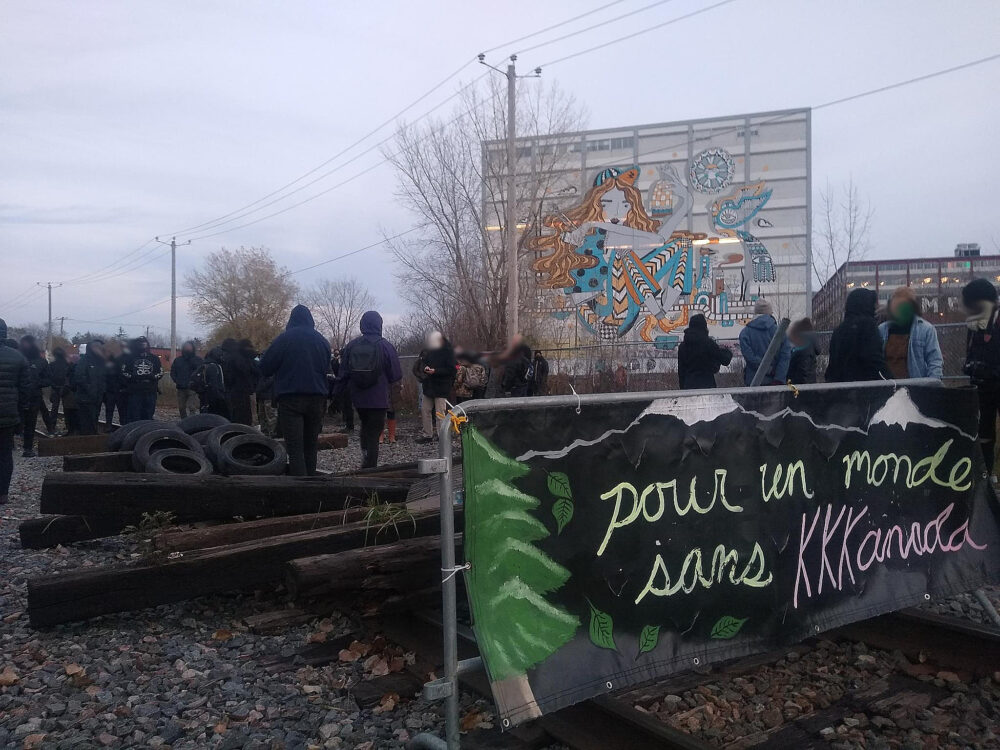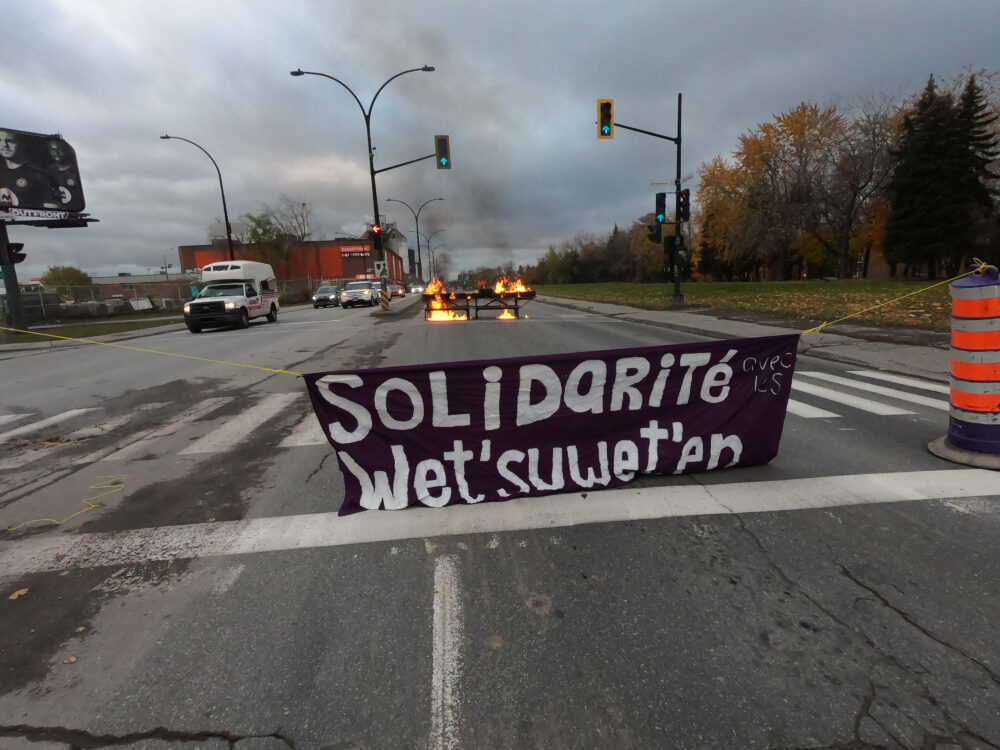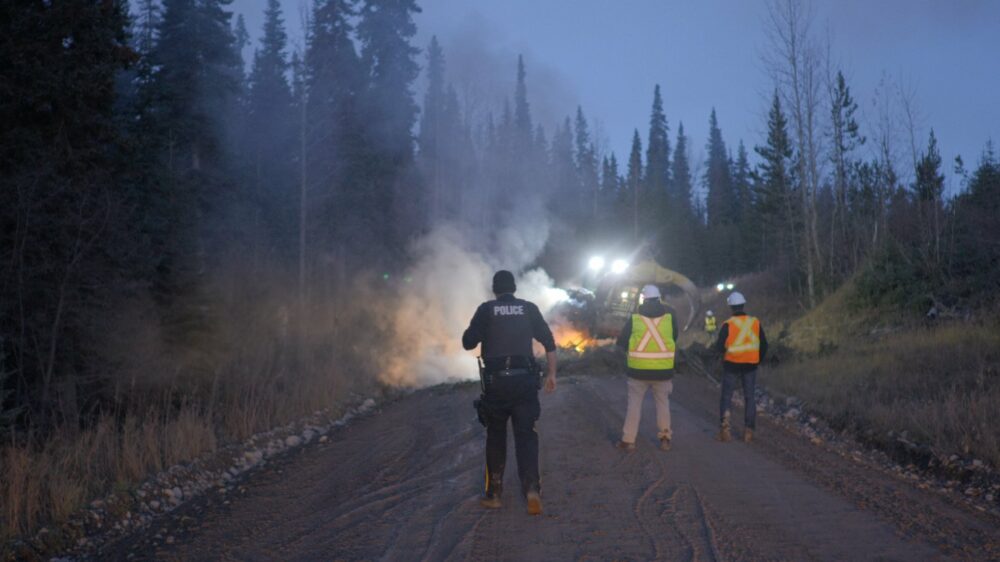
From Seeds of Resistance
This guide is an improved version of the practical section of the To Settlers, By Settlers callout that we recently re-published. Thank you to the reader who brought it to our attention.
The aim of information here is to disrupt rail flow, not be a catalyst for derailment or accidents, which could further injure life or land.
As always, we encourage folks to think about your heart, as well as the longevity of these actions and overall struggle; a gentle reminder that you are being careful with yourselves, fingerprints and DNA – for everyone’s safety – and that repression often follows action.
Prints
Fingerprints can be removed from hard surfaces with isopropyl alcohol. Wipe each item thoroughly in case something gets accidentally left behind or discovered – but aim to leave nothing behind. Where possible, it could be useful to have one person’s sole role be to ensure the tracking and removal of all equipment and debris. Store and pack equipment in a brand new, clean bag and only remove if wearing gloves. Some individuals wear two sets of gloves to ensure the outer set have no chance of print residue, while others wash using isoprpyl.
DNA
DNA can be transferred in a number of ways. Ensure you’re being diligent; don’t touch your face and cough you’re your hands while wearing gloves. You should be masked anyway, but consider wearing a medical mask to reduce droplet transmission. Keep your hair brushed (to remove loose hair) and tied back tightly – even covered. Don’t smoke or spit or drop garbage anywhere near your target area on the day of, or during scouting. Don’t leave anything behind. Be careful not to injure yourself on fencing or sharp corners. Properly dispose of masks, hats, gear, or clothing by burning thoroughly away from the site. Rainy days can be messy but good; they help wash away, displace and contaminate all evidence, including fibre and DNA. While you can use fire to dispose of clothing or evidence after-the-fact, you shouldn’t count on any incendiary materials left on site being burned so completely that DNA can’t be obtained. In other words – don’t use an old rag or t-shirt that’s been kicking around your place to ignite a fire assuming it will be burnt and therefor not leave DNA evidence. You never know if the fire will finish burning the material. Several people have been caught making that error. Sodium hydroxide (aka lye) can be found in some drain cleaners or being used by soap making will dissolve cellular proteins and destroy DNA evidence. The best defense however is to avoid contamination at all with appropriate preparation.
A Note on Bleach: Commercial bleach can destroy DNA enough to keep it from being replicated and tested in a lab for analysis, but it’s most reliable on hard surfaces and not always a sure thing. It does not keep hemoglobin from being detected. Oxidized bleach (such as bleach with hydrogen peroxide) can keep hemoglobin from being detected and therefor tested, but also does not reliably destroy DNA within an appropriate timeline.
Bottomline: If you’re not sure, be sure.
Copper Wire Method
– DO NOT ATTEMPT THIS ON SUBWAY TRANSIT LINES; they carry electricity.
– You can use this method when engaging in group NVCD to immediately send a signal to stop all train traffic.
The steel rails of tracks act as part of a track circuit for something called “automatic block signalling” (ABS). A very low voltage is sent through the rails to track sensors to create a loop in sets of geographic blocks. When a train moves along them, the train axle disrupts or shortens the circuit and sensors pick that up to indicate the block is occupied, automatically closing traffic in that area to other trains.
You can replicate the tripping of the circuit sensors by attaching copper wire to opposing rails.
1) Use a higher gauge copper wire for maximum conductivity and wrap it around one rail and across to the other. You can attach to the rails by digging out some rock near a wooden railway tie, or bolts on the tracks if you use a wire brush to take off the rust. Jumper cables work as a quick action – just make sure they’re long enough, but they’re also more expensive than a roll of copper wire.

2) Wire two opposing fishplates together. Fishplates are a flat panel of steel bolted onto the side of the rails where each rail section joins another. A fishplate has a plastic/rubber covered wire coming out of one side of the plate. You can strip or move some of this plastic and attach copper wire directly to that, and then attach the other end to the opposing rail, rail bolt, or other fishplate wire (for the best connection). The benefit of this method is that small gauge copper wire will conduct enough to trip the signal, and smaller wire is cheaper. The downside is that sometimes fishplates aren’t right across from each other – you’ll need to scout your location to make sure it’ll work.
TIPS: the copper needs to be touching areas on both rails that are NOT rusty/oxidized and still conducting. HIGH gage copper wire is necessary if your only points of connection are slightly rusty/oxidized. Have a lookout for trains and security patrols. Have a plan before you start wrapping or potentially triggering sensors. You may need a small tool to clear some crushed rock under the rail before wrapping the wire. Find a good spot, dig out both rails, and wrap one rail first. Remember as soon as you trip the circuit by connecting the wire to both rails the ABS will be tripped indicating something is wrong with the track. Get out as soon as you can. Burying the cable with crushed rock, snow or dirt will make it harder to find/spot within the block.
Destroying Signal Boxes
Signal boxes are part of rail circuits. If you walk railways, you’ve probably seen them as large grey shed like structures, or small grey boxes affixed to poles. These boxes are the receptors and interpreters of ABS circuit signals, road arms, etc. The casings are metal and typically secured closed. The small boxes on posts have cables that emerge, trail to the ground and run to the tracks. Since these wires have electrical components we would advise against simply cutting them unless you have a fair handle on understanding electricity and grounding.
Another method to damage wires and electrical circuits is hot fire. This means more than just dousing the cords in a fuel and walking away (this burns hot but doesn’t last) – it means building and ensuring a hotter, longer lasting fire. One good way to extend the burn of fibre (cotton fabric or cotton balls) is to add petroleum jelly and work it in. You’ll be able to just light that, which acts as a wick. To increase the heat of a fire you can add rubber from bicycle inner tubes or tires. Getting a small established fire like this going either in the circuit box/house or where the cord enters the ground should take care of the circuits and do a fine job delaying rail traffic by activating the ABS system in a longer-lasting way.
Notes: Practice building this kind of fire to see what’s possible. Burning rubber creates toxic fumes. Remember that this is arson – authorities will investigate it more seriously than the copper wire method. Be careful: find a good spot, have lookouts and an entry/exit plan that doesn’t expose you to people, ensure you’re being careful with fingerprints & DNA, properly dispose of any equipment used, have EXCELLENT security culture & practices with your crew.
Destroying Steel Rails
How do you destroy steel rails that hold a lot of tonnage every day? The same way they put them together: welding.
If you don’t happen to have several hundred dollars worth of equipment and an oxy-acetylene torch setup, you can still effectively destroy steel with thermite.
Thermite is a fuel/oxidizer ratio that can be adjusted to burn hot enough to destroy car engine blocks. It’s not particularly dangerous to mix BUT it does burn very hot, and very brightly so take precautions. When properly prepared, this method requires very little on-site time: just place, light and walk away. It also provides maximum physical property damage as the rail or signal box will need complete replacement.
The simplest fuel to use is aluminum powder. This can be collected from older etch-a-sketches or manufactured with (real) aluminum foil in a coffee grinder or blender that you never want to use for it’s intended purpose again. It is also a component in some fireworks (usually the silver ones) and most exploding gun targets (the small foil package or grey dust you’re supposed to mix in). The finer the flakes/powder the easier the ignition and faster the burn. You’ll want a fairly fine powder.
Cautions: very fine aluminum dust is explosive. However, you’re unlike to be able to achieve it with a regular household blender. Just in case, don’t open the blender near any open ignition sources. Very fine aluminum powder is also hard to get out of clothing, equipment, countertops, off skin etc. Be prepared to spend some time doing clean up. Wear a mask to prevent inhalation.
The simplest oxidizer to use with aluminum powder is iron oxide – red iron rust. Again, you can collect chunks of this from old items and turn it into a fine powder, or easily manufacture it by soaking ‘0000 grain’ steel wool in a 1:1 mix of bleach and vinegar in an OUTSIDE area. Plain bleach will work as well. Let it sit for a day to create a paste, which can they be dried and used.
Cautions: mixing bleach and vinegar makes a gas you shouldn’t inhale. While this is the fastest way to produce rust, you need to be able to do it in an outside, ventilated area. Otherwise, go with a single liquid method and give it more time.
You will also need an ignition wick. It takes a hot burn to ignite metal fuel so a lighter won’t work, and a firework fuse likely won’t either. Use either a silver burning (indicative of magnesium component) fireworks sparkler, or a homemade wick of match heads rolled into aluminum foil. We’ve had most luck with the matches/tinfoil method.
Cautions: Sparklers may present some risk of early ignition if the sparks coming off them hit the thermite before anticipated.
Thermite Powder
Mix a ratio of 3 parts (in weight) iron oxide to 2 parts aluminum powder (in weight). Cut or puncture a small wick hole on the side of a container (i.e. tin can). Insert your wick a couple inches so that there will be contact with the mixture in the can, and then fill the container with powder. Place and light where needed.
TIPS: unless the powder mix is fine and compacted, the burn will be less efficient and produce less heat!
Hard/Cake Thermite
3 parts iron oxide (in weight), 2 parts aluminum powder (in weight), 2 parts plaster of paris (in weight).
Mix the powders together, mix with plaster of paris. Pour into mold (can, etc.), insert wick into cake a couple inches on an angle. Let dry and remove from mould.
Mouldable Thermite
8 parts aluminum powder (in weight), 3 parts iron oxide (in weight), 4 parts clay (in weight). Mix the powders well then add to clay. Insert wick a couple inches. Place where needed and light.
Final Cautions: Because the thermite method damages the rail itself, it presents a risk of derailment. To avoid this risk you may want to trip the ABS circuit by applying copper wire across the rails as well (method one). Again, this is a method police are likely to investigate thoroughly. Make sure all items you’re leaving behind are free of fingerprints and DNA. Have lookouts and careful off-camera approaches. Dispose of or destroy clothing and boots. Thermite burns hot and bright – do not stare after ignition. Very fine aluminum powder is reactive to oxygen and can ignite easily. If water (rain, snow, puddles) is added to burning thermite it will cause an explosion that sends molten iron flying outwards. DO NOT try to extinguish burning thermite with water.









